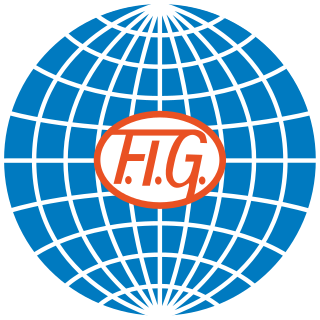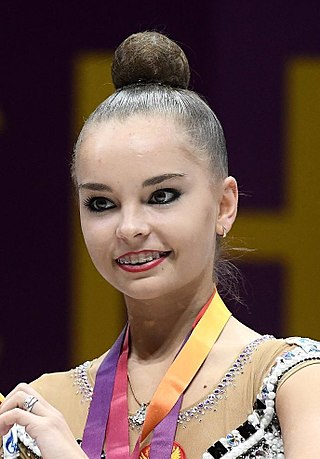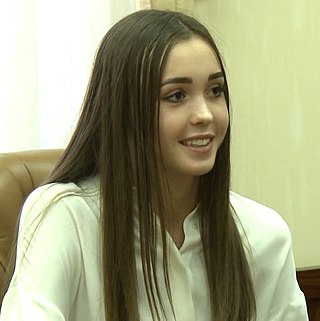Related Research Articles

Gymnastics is a type of sport that includes physical exercises requiring balance, strength, flexibility, agility, coordination, and endurance. The movements involved in gymnastics contribute to the development of the arms, legs, shoulders, back, chest, and abdominal muscle groups. Gymnastics evolved from exercises used by the ancient Greeks that included skills for mounting and dismounting a horse, and from circus performance skills.

Rhythmic gymnastics is a sport in which gymnasts perform on a floor with an apparatus: hoop, ball, clubs, ribbon and rope. The sport combines elements of gymnastics, dance and calisthenics; gymnasts must be strong, flexible, agile, dexterous and coordinated. Rhythmic gymnastics is governed by the International Gymnastics Federation (FIG), which first recognized it as a sport in 1963. It became an Olympic sport in 1984, with an individual all-around event. The group all-around competition was added to the Olympics in 1996. At the international level, rhythmic gymnastics is a women-only sport. The most prestigious competitions, besides the Olympic Games, are the World Championships, World Games, European Championships, European Games, the World Cup Series and the Grand Prix Series. Gymnasts are judged on their artistry, execution of skills, and difficulty of skills, for which they gain points. They perform leaps, balances, and rotations along with handling the apparatus.

The International Gymnastics Federation is the body governing competition in all disciplines of gymnastics. Its headquarters is in Lausanne, Switzerland. It was founded on July 23, 1881, in Liège, Belgium, making it the world's oldest existing international sports organisation. Originally called the European Federation of Gymnastics, it had three member countries—Belgium, France and the Netherlands—until 1921, when non-European countries were admitted and it received its current name.
The Rhythmic Gymnastics World Championships are the world championships for the sport of rhythmic gymnastics. The tournament is promoted and organized by the Fédération Internationale de Gymnastique (FIG). It is one of the three tournaments in rhythmic gymnastics officially organized by FIG, as well as the Rhythmic Gymnastics World Cup and the gymnastics competitions at the Olympic Games. The first edition of the World Championships was held in 1963, a time when the sport was known as modern gymnastics. The current program of the World Championships contemplates both individual and group performances. In even non-Olympic years and the year before the Olympics, a team event is also contested. Two events are not competed at the World Championships anymore: individual rope and free hands.
The Rhythmic Gymnastics World Cup is a competition for rhythmic gymnastics sanctioned by the Fédération Internationale de Gymnastique (FIG). It is one of the few tournaments in rhythmic gymnastics officially organized by FIG, as well as the World Championships, the gymnastics competitions at the Olympic Games and the Youth Olympics, and the rhythmic gymnastics events at the World Games. The World Cup series should not be confused with the Rhythmic Gymnastics Grand Prix series, which is neither officially organized nor promoted by FIG.

Arina Alekseyevna Averina is a Russian individual rhythmic gymnast. She is a 2020 Summer Olympics finalist, a two-time world all-around silver medalist, a two-time European all-around champion and the 2016 Grand Prix Final all-around bronze medalist. She is a three-time (2019-2021) Russian national all-around champion and a three-time Russian national all-around medalist. Her identical twin sister Dina Averina is also a competitive rhythmic gymnast.
These are four lists of achievements in major international gymnastics events according to first-place, second-place and third-place results obtained by gymnasts representing different nations. The objective is not to create combined medal tables; the focus is on listing the best positions achieved by gymnasts in major international competitions, ranking the nations according to the most number of podiums accomplished by gymnasts of these nations. All seven competitive disciplines currently recognized by the International Gymnastics Federation (FIG) are covered: 1) acrobatic gymnastics, 2) aerobic gymnastics, 3) men's artistic gymnastics, 4) women's artistic gymnastics, 5) women's rhythmic gymnastics, 6) trampoline and tumbling, and 7) parkour.
Sabina Ashirbayeva is a retired individual Kazakh rhythmic gymnast. She is the 2016 Asian Championships All-around bronze medalist.
FIG World Cup refers to a number of events organized by the International Gymnastics Federation (FIG) across seven competitive gymnastics disciplines: 1) acrobatic gymnastics, 2) aerobic gymnastics, 3) men's artistic gymnastics, 4) women's artistic gymnastics, 5) women's rhythmic gymnastics, 6) trampoline and tumbling, and 7) parkour.
Liu Jiahui is a Chinese individual rhythmic gymnast.
Olena Mykolayivna Dmytrash is a Ukrainian group rhythmic gymnast. She is the 2013 World bronze medalist in 10 clubs and 2015 Universiade champion in 6 clubs + 2 hoops.
Eleni Doika is a Greek group rhythmic gymnast. She represents her nation at international competitions.

Stavroula Samara is the captain of the a Greek group in rhythmic gymnast. She represents her nation at international competitions including Olympic Games, World Championships, European Championships and World Cups from 2009 - 2016.
Mira Bimperling is a German group rhythmic gymnast. She represents her nation at international competitions.
Hanna Hancharova is a Belarusian individual and synchronised trampoline gymnast, representing her nation at international competitions.
Shu Siyao is a Chinese rhythmic gymnast. She won a gold medal at the 2014 World Cup in Debrecen, Hungary. She competed in the group rhythmic gymnastics competition at the 2016 Summer Olympics, where the team was eliminated in the qualification round. After the Rio Olympics in 2016, Shu Siyao chose to retire and became a rhythmic gymnast. She took up the sport at age six in the Sichuan province, China.

Alexandra Kiroi-Bogatyreva is an Australian rhythmic gymnast. Kiroi-Bogatyeva was the 2018, 2019, 2022 and 2023 Australian All Around Rhythmic Gymnastics Champion. She won gold medal at 2022 Commonwealth Games for her clubs routine in individual apparatus finals.

Evgeniia Levanova is a Russian group rhythmic gymnast. She is a three-time (2017–2019) World Group all-around champion.
Sabina Tashkenbaeva is a former Uzbekistani rhythmic gymnast. She is the 2019 Asian Championships all-around gold medalist.
Mariia Olehivna Vysochanska is a Ukrainian female rhythmic gymnast. She won two gold, one silver and one bronze medal at the 2020 European Championship.
References
- ↑ Baldinacci, Giorgia (2017-08-31). "DIRETTA - Ginnastica ritmica, Mondiali Pesaro 2017: qualificazioni individuali (LIVE)". SportFace (in Italian). Retrieved 2022-01-22.
- ↑ "SACHMANN Nicoline - Denmark". www.gymnastics.sport.